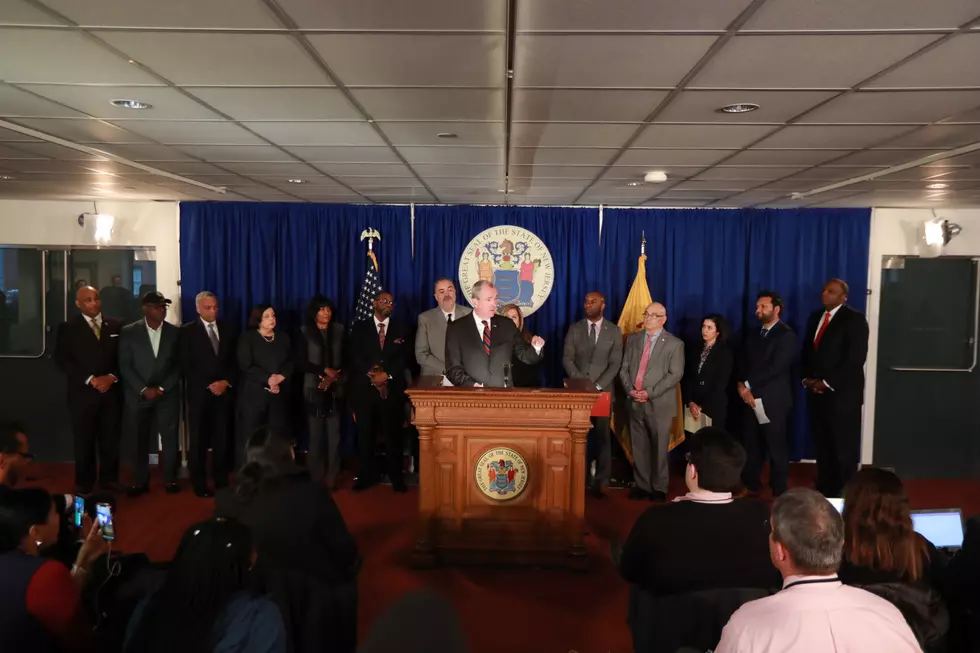
Murphy highlights social justice in scramble for marijuana votes
Gov. Phil Murphy continued his so-far elusive search for enough votes in the Legislature to legalize marijuana Thursday by emphasizing how it would erase hundreds of thousands of past convictions, in an apparent attempt to court black lawmakers whose priority is social justice.
At a news conference in his office, Murphy said the status quo is unacceptable and that the bill would accomplish changes no state has ever done, in any context. He said the bill isn’t perfect but is “pretty darn good” and should be approved by lawmakers Monday.
“We have a chance, one chance, to protect our kids. We have one chance to drive the bad guys out of this business. We have one chance to regulate it ourselves, with the right leadership,” Murphy said. “We have one chance to undo extraordinary social injustices that have built up over decades.”
In all Murphy was flanked by 14 speakers, including a number of black church pastors and leaders of civil-rights groups.
“Let’s be clear: The NAACP is not encouraging marijuana use. Let’s not get it confused,” said Richard Smith, its New Jersey president. “But our current system gives too much access to marijuana to young people. We need to move marijuana and marijuana dealers off the corners and put it behind the counter, where it can be regulated. And that can be done on Monday.”
“One of the talking points has been that marijuana is a gateway drug,” Smith said. “A gateway drug. And we agree. It’s a gateway to county jail or state prison if you are black or brown.”
“New Jersey has the opportunity to literally set captives free from prison, probation, parole and a life stigmatized and shackled by a criminal record,” said the Rev. Charles Boyer, who heads a group called Salvation and Social Justice and is pastor of Bethel AME Church in Woodbury.
“And although the bill still lacks robust and overt community reinvestment, it is another major step in dismantling and abolishing the war on black and brown people,” Boyer said.
The bill does contain measures intended to help steer the economic benefits toward traditionally disadvantaged people and areas. It prioritizes applicants in 16 cities deemed “impact zones,” sets goals for minority-, women- and veteran-owned entities and creates conditional licenses for smaller applicants who lack the track record and financial backing of larger, corporate applicants.
“It’s pretty aggressive,” Murphy said. “In fact, it’s not just pretty aggressive, no state that’s done this has come close to that.”
“Social justice and economic development go hand in hand,” said Trenton Mayor Reed Gusciora.
“We can elevate more boats here in New Jersey,” said John Harmon, president and chief executive officer of the African American Chamber of Commerce of New Jersey. “This is the time to really leverage the diversity of this state to do something good.”
Those potential economic benefits played second fiddle at Thursday’s event to the potential impact of expungement changes planned in connection with marijuana legalization – making it easier, cheaper and quicker to erase past marijuana convictions from criminal records.
“This will be monumental for communities of color,” said Lloyd Freeman, immediate past president of the Garden State Bar Association.
Assemblywoman Annette Quijano, D-Union, said it’s not feasible to automatically expunge all past marijuana convictions because they’re across dozens of computer systems and filing systems that still rely on index cards. But she said people would be able to file for free and have the courts do that work.
“Just because a record is expunged does not mean that the collateral effects of it simply go away,” Quijano said. “This is why the bill contains virtual expungements, which basically say that marijuana charges cannot be considered, for example, when applying for a job or financial aid or housing.”
Roseanne Scotti, the director of the New Jersey Drug Policy Alliance, said more than 32,000 a year are arrested in the state for marijuana possession alone.
“This derails their lives and imperils their futures,” Scotti said. “These individuals are our friends, our families and our neighbors. If this legislation passes on Monday, these unjust arrests will be a thing of the past.”
“There’s few pieces of legislation that would help so many people and save so many people’s lives,” Scotti said. “The day has come to make it a reality that no one else will suffer from these arrests, from these convictions and from the destruction it wreaks on people’s lives.”
If the bill isn’t passed Monday, Murphy indicated his administration will move quickly to expand the number of medical marijuana dispensaries in the state.
There are currently six, with an additional six approved – and well over 100 additional applicants who weren’t awarded licenses after last year’s solicitation.
“We have put off for now months and months and months the enormous demand for medical marijuana,” Murphy said. “We have resisted granting more licenses. That a unilateral action that our Department of Health, I don’t want to speak for the Department of Health, but that our administration can take. We’ll have no other choice.
“And that will be a significant number,” he said. “I’m not sure what that number looks like, but that’ll be a big number. It won’t be six. It will be many, many multiples of that. But I will do that with a very, very heavy heart.”
More From 92.7 WOBM










